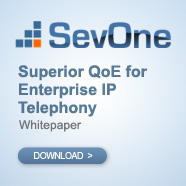The Specter of Spectrum Scarcity
When AT&T had finally interred any hope of acquiring T-Mobile, the company issued a dire warning that, as a direct result of spectrum scarcity, "customers will be harmed and needed investment will be stifled."
Couched as it was, it appeared on the surface as, simply, the vitriol of a sore loser. Nevertheless, there is a specter of spectrum scarcity looming over the industry. AT&T's $1.9 billion purchase of Qualcomm's 700 MHz spectrum licenses took the edge off, but the company needs more just to keep pace with rival Verizon. DISH Network is sitting on a heap of spectrum and, as CEO Joe Clayton told Bloomberg, "[DISH is] open to all possible options. We could be acquired or we could be the acquirer." Right about now, the satco has got to be looking to AT&T like a Porterhouse to the starving man, like in those old Warner Bros. cartoons. The rumor mill is churning with whispers that AT&T is looking into a DISH buy, but the consensus seems to be that any purchase would be made at a premium. Other possible takeover targets include Leap Wireless and MetroPCS.
Said rival Verizon has its red hands full with spectrum issues as well. Following the FCC's initiation of a review of Verizon's deals with SpectrumCo and Cox, a gaggle of CSPs, including C Spire, DirecTV, Sprint and T-Mobile are clamoring for more information on Verizon's $3.6 billion spectrum grab. Verizon is arguing that, since the cableco agreements involve more than simply spectrum, the FCC needn't concern itself. We'll see how that works out for them. Meanwhile, the Justice Department is investigating the cable deals from an antitrust angle.
As the World of Indian Telecom Turns
India's Telecom Commission has ruled to allow operators in that country to share 2G—but not 3G—spectrum, with some stipulations. Recall, the big telecom players had invited India's prime minister to a summit back in November to address their discontent with the government's move to disallow intra-circle 3G roaming.
This latest episode in India's telecom soap opera finds the major wireless operators in India unaware of the Telecom Commission's decision, because it was not announced by the government, as reported by the Economic Times.
The Telecom Commission provided the following strictures to 2G spectrum sharing:
- Only operators that hold spectrum in a given region can share it in that region
- Spectrum sharing is subject to the same merger limits as set forth by the TRAI: combined spectrum cannot exceed 25 percent of the total airwaves in a region, and deals require renewal every five years
- Spectrum sharers must pay usage charges based on total airwaves held jointly; operators share 2-6 percent of annual revenue depending on the quantity of airwaves held
- Sharers must pay the government on the commercial value of its own spectrum as well as of its roaming partner's
- The Telecom Commission conceded that partners may pay on an annual basis, rather than in 5-year lumps, and can cease payments if they annul their agreement partway
Tune in next week, as another drama-filled episode of Indian telecom is sure to come.











